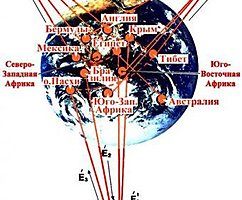Why Russia is almost no civil / commercial high-tech manufacturing?
 Bashny.Net
Bashny.Net
63,989,448
Articles with Overview of microelectronics in Russia I finished the statement that Russia now has the technical capability to create any military chips (except the price). However, in the comments to that article, and many others - all the more concerned by the question of absence (at the level of measurement error) produced purely commercial (civil) of high-tech products. This question troubled me, because I was constantly tormented by the question of all those who in one way or another connected with high technology and business in Russia.
The answer to it is important, if you do want to create a competitive high-tech product - not to spend the best years of his life in the initially unequal conditions.
Under the cut try to understand the differences between "high tech" companies from "low-tech", you need to high-tech companies can be born and survive, why with the software we have is better than Hardy, where to start Silicon Valley in the United States and whether it "copy "Why China is all tears, and - Okin's eye all that is happening in Skolkovo, Rusnano, fund promising research and whether they will lead to the flourishing of Russian innovation. Certainly, I'm somewhere I could be wrong - I will be glad to additions in the comments.
Immediately it should be noted that due to the many facets of the volume of the article turned out pretty big, so you can start reading from the summary at the end, and then read only those sections that will be of interest. Just want to warn - the story of "nonlinear" neighboring headers can describe different aspects of the problem and to be with each other virtually unrelated.
The situation with the high-tech manufacturing with height
High-tech business - creates products with high development costs, requires a large number of operations. Accordingly, it is necessary for the commercial success of a lot of cheap capital, the minimum additional logistics costs and bureaucracy, the highest sales worldwide for the cost of development "smear" on the maximum number of copies of the final product.
Examples:
Developed iPhone and software for it - organized production - to sell products Developed processor - implemented support for operating systems and third-party software - ordered production - to sell products Developed technology to produce chips on 10nm technology - developed libraries - licensed manufacturer We developed a general-purpose chip - ordered production - advertised - sold through distributors to develop nuclear reactor - built at the customer - helped with the operation .
Consider the example - CD / DVD-RW Consider the example - CD / DVD-RWStoit task - you need to put the party CD / DVD pisalok.
low-tech business:
telephoned wholesalers have found that it is cheaper Acquired Party (often with the ability to pay later) 1 went through customs again. Sell. Put your 05.10.50% in the pocket.
High-tech business:
It would seem to make the device read / write just such concentric "grooves" should not be difficult:
83,641,891

Downloads access to specifications for CD and DVD. We hired engineers developed the electronics (controller, power section motor control, control of laser diodes and photodiodes). We developed a chip controller (to minimize the cost of a series) to order the production of masks for mass production controller chip (steep and we do immediately without any errors) to order the production batch of plates, their cutting, korpusirovku and testing hire a developer firmware (Support all formats, error correction codes, etc.) We hired optometrists who develop a system read / write from 2 different laser diodes (red for DVD and IC for CD) without loss of power using cunning dichroic filters. to order the production of the prototype dichroic filters, mirrors, 4 lenses (probably at least 1 of them aspherical), molds for casting plastic lenses for mass production. Tk. screw drive carriage motor has about 5mm pitch and a stepper motor is at best a 200 steps per revolution, we obtain the minimum step of the carriage of the order of 25 microns, and the interval of the tracks on the DVD - 0.74 micron. Develop electromagnetic system shift lens with 4 coils in the horizontal plane and in the vertical (focus + support multi-layer discs) hire a developer mechanics developed and ordered construction of molds for plastic parts and molds carriage. to collect all the parts for the first prototype - everything worked almost from the first time
At the time of receipt of pre-prototype we have already spent about $ 5-15mln. Further - although the cost price of large-scale production of the finished product may be quite low (10-50% of the sale price), in order to "recapture" those $ 15m spent on development, back interest on loans to compensate for the risks that taking on investors - need to to produce a product in a series of 1-10 million units and above.
Ie risks are quite high, a lot of clearing customs and logistics in general, higher capital requirements, it is necessary to find and hire a large number of developers in different areas, and the expected profit - quite modest and totally inadequate by Russian standards required Herculean efforts (compared to the banal or trade construction). And most importantly - the success of the event depends on the volume of the series. No power on earth will make from scratch in 1000 with DVD-pisalok okolorynochnoy price - you need to look for someone to sell just 10 million pisalok. On the other hand - the competitors their development costs have long been recaptured, and have the ability to sell the product close to production costs.
Accordingly, if the come out with the same product on an already busy market ("catch up and overtake") - to achieve commercial success is almost impossible, absolutely need something significantly improves consumer properties (the notorious "innovation").
Why do business in Russia is so reluctant to go to high technology? This is the most important issue, it even has repeatedly raised but left unanswered Chief Nanotechnology in Russia abbr>.
The answer is simple - serious business always goes where larger rate of return and less risk.
In the context of an idealized competitive rate of return "simple" business tends to zero, and in countries where capitalism for hundreds of years - it forces constantly think of something for the sake of excess interest earnings and in extreme cases - to go to the "unpleasant" high-tech business where high demands to capital, long payback periods and high risks. You can not open another store - in all the "tasty" all locations already open, you can not drill a well to the "easy" oil - all comfortable deposits have been completed, you can certainly go to work - but because of the wildest competition had to be satisfied units per annum.
In Russia, as in the early '90s survived and was privatized is a simple business, and the first generation of liberal businessmen lobbied for such legislation changes that maintain high returns without a care in the high technology. Since the civil high-tech business almost was not - his interests and there was no one to protect.
If there was an iron curtain - the existence of high-tech production in such conditions, it would still be possible, just those who practice it - to sell goods produced with the worst performance at a significantly higher price (in the high-tech - smaller lot = higher price). However, with open borders domestic manufacturer in such circumstances inevitably loses compete with imports, and any reasonable level of fees will not change anything here.
Current situation even without manual intervention in the long term and unstable as the "maturation of capitalism" for 2-4 generations (50-100 years), the rate of profit is just business naturally decrease (due to the natural change of generations of owners of big business).
Where historically born high-tech production in the west? Tubes owe their aggressive development not warm tube sound, and radar and military communications. The first computers did not come up for a game of tic-tac-toe - and for ballistic calculations: who considered it faster and more accurate elevation guns - the winner.
Ie
href="http://www1.fcenter.ru/forprint.shtml?online/articles/hardware/processors/15730">пальцем
Ie
href="http://ru.wikipedia.org/wiki/%D0%93%D0%BE%D0%BB%D0%BB%D0%B0%D0%BD%D0%B4%D1%81%D0%BA%D0%B0%D1%8F_%D0%B1%D0%BE%D0%BB%D0%B5%D0%B7%D0%BD%D1%8C">голландская
href="http://en.wikipedia.org/wiki/United_States_Enrichment_Corporation">затруднительно
Articles with Overview of microelectronics in Russia I finished the statement that Russia now has the technical capability to create any military chips (except the price). However, in the comments to that article, and many others - all the more concerned by the question of absence (at the level of measurement error) produced purely commercial (civil) of high-tech products. This question troubled me, because I was constantly tormented by the question of all those who in one way or another connected with high technology and business in Russia.
The answer to it is important, if you do want to create a competitive high-tech product - not to spend the best years of his life in the initially unequal conditions.
Under the cut try to understand the differences between "high tech" companies from "low-tech", you need to high-tech companies can be born and survive, why with the software we have is better than Hardy, where to start Silicon Valley in the United States and whether it "copy "Why China is all tears, and - Okin's eye all that is happening in Skolkovo, Rusnano, fund promising research and whether they will lead to the flourishing of Russian innovation. Certainly, I'm somewhere I could be wrong - I will be glad to additions in the comments.
Immediately it should be noted that due to the many facets of the volume of the article turned out pretty big, so you can start reading from the summary at the end, and then read only those sections that will be of interest. Just want to warn - the story of "nonlinear" neighboring headers can describe different aspects of the problem and to be with each other virtually unrelated.
The situation with the high-tech manufacturing with height
- Economy
In the case of Russia, for several reasons low-tech business (construction, trade, natural resources) may have too high a profit - and it makes a high-tech business completely pointless from an economic point of view. On the other hand - the scheme of work on public contracts preclude obtaining large profits (usually required to show a net profit of about 5%), requires the provision, dual use can be difficult because of the privacy and property of the state to the resulting intellectual property - ie Again, it is not attractive for a commercial artist. - The cost and availability of capital Men outsourcing .
It is believed that the fundamental and applied science should generate innovation - but in practice this does not happen - again because of the bureaucracy, inability to quickly attract money to test ideas, "washout brains" (care of people on the "low-tech", but a high-paying job). - Bureaucracy and Logistics Public policies of other countries and Patents
The reality is not so: the high-tech business - has high capital requirements, long payback periods, there is always a risk, profit drips slowly and not impressive (only sometimes outstanding results - when received "closes" a patent on a very tasty technology and have the resources to defend it in court - however these technologies and develop cheap will not work). In the west, in the high-tech went only because in a normal, business as there was nothing to do + State paying job in military contracts - making intellectual property leave the contractor and used for commercial purposes.
In addition, those who listen to American political programs for "internal use" - probably heard the phrase «Bringing the Jobs Back Home»: it is actually a recognition that post-industrial economy ("we develop and monkeys overseas collect") - has not justified and leads to the extinction of entire sectors of the economy. Because blindly copying American "post-industrial" way clearly not worth it.
Here is a quote from vasiaa , slipped on the forum on microelectronics, successfully emphasizes the current situation:
Angstrom quite poor, the export of 132 million rubles. And the products are sold entirely on 700-800 million rubles, or US $ 25-30mln ... I have a friend just in Zelenograd company has construction and repair about the same turnover in the year. blockquote> Related link with numbers.
Learn more about the difference between "high tech" business and "low-tech» low-tech business - creates added value by moving goods created by others, and create products for the production of which need one process operation without a lot of their own intellectual property. Often geographically tied to the source of resources (hydroelectric, coal mine, oil field, mine engineers to outsource).
Examples:
- Downloads goods wholesale - sell at retail.
High-tech business - creates products with high development costs, requires a large number of operations. Accordingly, it is necessary for the commercial success of a lot of cheap capital, the minimum additional logistics costs and bureaucracy, the highest sales worldwide for the cost of development "smear" on the maximum number of copies of the final product.
Examples:
Developed iPhone and software for it - organized production - to sell products Developed processor - implemented support for operating systems and third-party software - ordered production - to sell products Developed technology to produce chips on 10nm technology - developed libraries - licensed manufacturer We developed a general-purpose chip - ordered production - advertised - sold through distributors to develop nuclear reactor - built at the customer - helped with the operation .
Consider the example - CD / DVD-RW Consider the example - CD / DVD-RWStoit task - you need to put the party CD / DVD pisalok.
low-tech business:
telephoned wholesalers have found that it is cheaper Acquired Party (often with the ability to pay later) 1 went through customs again. Sell. Put your 05.10.50% in the pocket.
High-tech business:
It would seem to make the device read / write just such concentric "grooves" should not be difficult:
83,641,891

Downloads access to specifications for CD and DVD. We hired engineers developed the electronics (controller, power section motor control, control of laser diodes and photodiodes). We developed a chip controller (to minimize the cost of a series) to order the production of masks for mass production controller chip (steep and we do immediately without any errors) to order the production batch of plates, their cutting, korpusirovku and testing hire a developer firmware (Support all formats, error correction codes, etc.) We hired optometrists who develop a system read / write from 2 different laser diodes (red for DVD and IC for CD) without loss of power using cunning dichroic filters. to order the production of the prototype dichroic filters, mirrors, 4 lenses (probably at least 1 of them aspherical), molds for casting plastic lenses for mass production. Tk. screw drive carriage motor has about 5mm pitch and a stepper motor is at best a 200 steps per revolution, we obtain the minimum step of the carriage of the order of 25 microns, and the interval of the tracks on the DVD - 0.74 micron. Develop electromagnetic system shift lens with 4 coils in the horizontal plane and in the vertical (focus + support multi-layer discs) hire a developer mechanics developed and ordered construction of molds for plastic parts and molds carriage. to collect all the parts for the first prototype - everything worked almost from the first time
At the time of receipt of pre-prototype we have already spent about $ 5-15mln. Further - although the cost price of large-scale production of the finished product may be quite low (10-50% of the sale price), in order to "recapture" those $ 15m spent on development, back interest on loans to compensate for the risks that taking on investors - need to to produce a product in a series of 1-10 million units and above.
Ie risks are quite high, a lot of clearing customs and logistics in general, higher capital requirements, it is necessary to find and hire a large number of developers in different areas, and the expected profit - quite modest and totally inadequate by Russian standards required Herculean efforts (compared to the banal or trade construction). And most importantly - the success of the event depends on the volume of the series. No power on earth will make from scratch in 1000 with DVD-pisalok okolorynochnoy price - you need to look for someone to sell just 10 million pisalok. On the other hand - the competitors their development costs have long been recaptured, and have the ability to sell the product close to production costs.
Accordingly, if the come out with the same product on an already busy market ("catch up and overtake") - to achieve commercial success is almost impossible, absolutely need something significantly improves consumer properties (the notorious "innovation").
Why do business in Russia is so reluctant to go to high technology? This is the most important issue, it even has repeatedly raised but left unanswered Chief Nanotechnology in Russia abbr>.
The answer is simple - serious business always goes where larger rate of return and less risk.
In the context of an idealized competitive rate of return "simple" business tends to zero, and in countries where capitalism for hundreds of years - it forces constantly think of something for the sake of excess interest earnings and in extreme cases - to go to the "unpleasant" high-tech business where high demands to capital, long payback periods and high risks. You can not open another store - in all the "tasty" all locations already open, you can not drill a well to the "easy" oil - all comfortable deposits have been completed, you can certainly go to work - but because of the wildest competition had to be satisfied units per annum.
In Russia, as in the early '90s survived and was privatized is a simple business, and the first generation of liberal businessmen lobbied for such legislation changes that maintain high returns without a care in the high technology. Since the civil high-tech business almost was not - his interests and there was no one to protect.
If there was an iron curtain - the existence of high-tech production in such conditions, it would still be possible, just those who practice it - to sell goods produced with the worst performance at a significantly higher price (in the high-tech - smaller lot = higher price). However, with open borders domestic manufacturer in such circumstances inevitably loses compete with imports, and any reasonable level of fees will not change anything here.
Current situation even without manual intervention in the long term and unstable as the "maturation of capitalism" for 2-4 generations (50-100 years), the rate of profit is just business naturally decrease (due to the natural change of generations of owners of big business).
Where historically born high-tech production in the west? Tubes owe their aggressive development not warm tube sound, and radar and military communications. The first computers did not come up for a game of tic-tac-toe - and for ballistic calculations: who considered it faster and more accurate elevation guns - the winner.
Ie
href="http://www1.fcenter.ru/forprint.shtml?online/articles/hardware/processors/15730">пальцем
Ie
href="http://ru.wikipedia.org/wiki/%D0%93%D0%BE%D0%BB%D0%BB%D0%B0%D0%BD%D0%B4%D1%81%D0%BA%D0%B0%D1%8F_%D0%B1%D0%BE%D0%BB%D0%B5%D0%B7%D0%BD%D1%8C">голландская
href="http://en.wikipedia.org/wiki/United_States_Enrichment_Corporation">затруднительно
Tags
See also
Mind Games (17 photos)
Bill Gifford: how to grow old with dignity
We have a serious problem — a total intolerance of a slow ride
Cranberry — interesting facts and original recipes
How to choose and use Cyrillic fonts in design: the best fonts by category, commercial fonts, features and development
Free
Imaginary historical characters who have left a huge legacy
Around Baikal by train
Five scientific facts that allow to sell anything
















